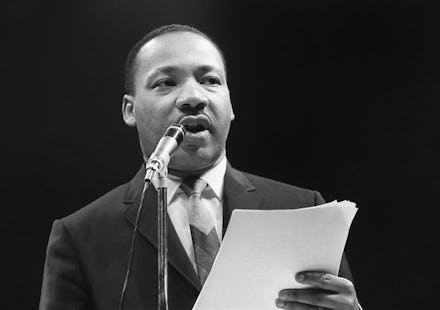The One Perfect Martin Luther King Jr. Quote That Everyone Needs to Remember During Riots

Baltimore is in flames, and everybody has an opinion.
Riots, at least when they're not being committed by white sports fans, polarize the public and prompt people to engage in particularly ostentatious displays of allegiance or condemnation. Nuance disintegrates, and the debate is reduced to a simplistic binary: Are you with the rioters, or are you against them?
In the online conversation that's developed around the riots in Baltimore Monday night — which began hours after the funeral of Freddie Gray, a young black man who died in police custody last week — a more ambiguous sentiment seems to have crept its way into the debate. It comes in the form of a lyrical Martin Luther King Jr. quote: "A riot is the language of the unheard."
The quote derives its power from its ambition to explain riots rather than rush judgment on their morality or effectiveness. Undoubtedly, King's words on the meaning of riots possess all the more power because of his iconic commitment to nonviolence.
Context is key: But lost in the discussion surrounding Baltimore is the the full context of the King quote, which makes his words even more powerful. He expressed this idea about riots on a number of occasions, but the most famous instance of it appears in his speech about the discrepant conditions of white and black America, entitled "The Other America."
The speech, which was delivered in 1967 at Stanford University, touches on the riots in major American cities during the 1960s. King uses the occasion to makes an even more interesting point than one might deduce from that one well-worn, tweetable sentence.
After making a statement against the riots and reaffirming his commitment to nonviolence, King explains that condemning the riots must be coupled with a condemnation of the circumstances that produced them:
But at the same time, it is as necessary for me to be as vigorous in condemning the conditions which cause persons to feel that they must engage in riotous activities as it is for me to condemn riots. I think America must see that riots do not develop out of thin air. Certain conditions continue to exist in our society which must be condemned as vigorously as we condemn riots.
After the oft-quoted remark about riots he said:
And what is it that America has failed to hear? It has failed to hear that the plight of the Negro poor has worsened over the last few years. It has failed to hear that the promises of freedom and justice have not been met. And it has failed to hear that large segments of white society are more concerned about tranquility and the status quo than about justice, equality and humanity.
King shuns the common analysis of riots as irrational spasms of anger and instead assigns them rationality. Riots are emotional in nature, but their origins are a response to the concrete afflictions of poverty and racial oppression. In King's reckoning, the mob is a manifestation of America's social and political defects, and our foremost ethical duty is to listen.
The entire speech is an extraordinary work of rhetoric — you should read the full thing here, or watch it below: